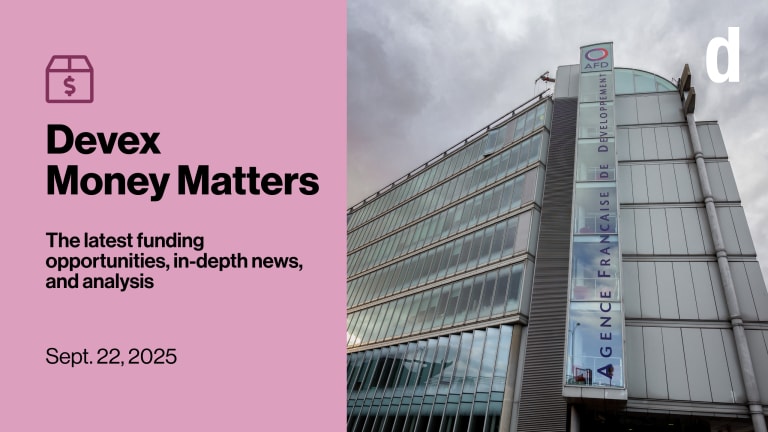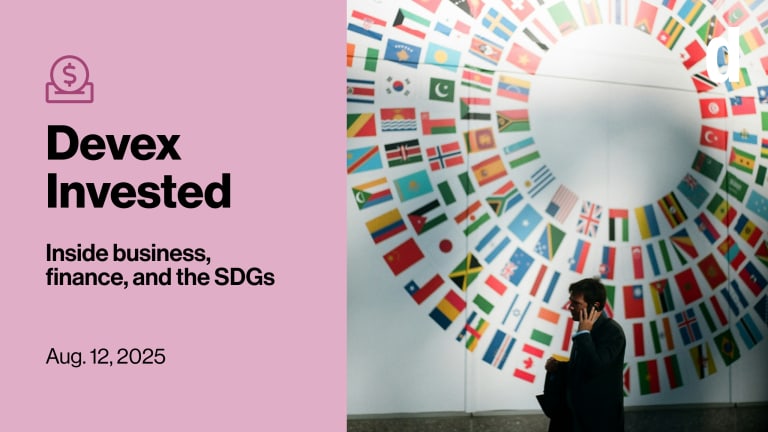
PARIS — France wants to see G-7 countries use a combination of guarantees, equity, and technical assistance to generate $3 billion in loans for female African entrepreneurs as one of its main “deliverables” at next month’s summit in Biarritz, officials told Devex.
Civil society organizations met with French government ministers in a series of roundtables Tuesday in Paris, organized under the G-7 priorities, which include inequality, digitalization, climate, and women’s rights, with a particular focus on the Sahel region.
“Africa has been on the menu of all the G-7 or G-8 meetings, for at least 15 years. We make the declarations, [then] nothing.”
— A.T. Moussa Tchangari, secretary-general, Alternative Espaces CitoyensPhilippe Étienne, the incoming French ambassador to the United States in charge of organizing the G-7, gave participants a flavor of what to expect from the summit on Aug. 24-26. He flagged initiatives to develop digital networks in Africa, improve market transparency, and support female entrepreneurs.
More from G7 2018:
► Global coalition asks G7 for $1.3B for girls' education
► G7 brings Canadian indigenous voices to the table on development
► No mention of reproductive rights in declarations out of G7 development ministerial
Countries such as Rwanda, South Africa, Egypt, and Senegal had been invited to help shape the G-7 agenda during the planning stage, rather than having African heads of state arrive to read preprepared statements as in previous years, a French official, authorized to speak on condition of anonymity, told Devex.
The official said the plan to support female entrepreneurs was designed with the African Development Bank and would extend the work of the Affirmative Financial Action for Women in Africa program.
G-7 countries will be encouraged to provide technical assistance to help remove barriers to women’s access to finance, allocate budget guarantees, and grow the equity of the African Guarantee Fund, which aims to ease access to finance for African SMEs.
Germany, the United Kingdom, Italy, and Canada are among those interested in providing funding, the official said, adding that the total amount from donors remains a “work in progress” but that the plan is to generate $3 billion in loans from local banks for female entrepreneurs.
Sophie Chassot, advocacy officer at CARE France, told Devex the initiative would only succeed if it came as part of a broader strategy aimed at tackling harmful social norms and improving women’s access to basic services, as well as sexual and reproductive health and rights.
“We call on all G-7 countries to pledge on this initiative with new financial commitments,” Chassot said, adding that it should come with specific targets and follow-up mechanisms. “This money must be additional to the fund of €120 million [$135.5 million] for feminist organizations created by France a few months ago,” she stressed.
Adequate follow-up was also on the mind of another participant at Tuesday’s consultation.
A.T. Moussa Tchangari, secretary-general at Alternative Espaces Citoyens, an NGO in Niger, said during a roundtable session that: “Africa has been on the menu of all the G-7 or G-8 meetings, for at least 15 years. We make the declarations, [then] nothing.”
NGOs presented their proposals Tuesday afternoon to French Foreign Minister Jean-Yves Le Drian, who stood in after President Emmanuel Macron was delayed in Brussels, Belgium. Macron sent his apologies via a video on Twitter, promising to study the suggestions and explaining the negotiations on new leaders for the European Union institutions were part of ensuring the success of France’s G-7 priorities.
Ideas from NGOs ranged from vague calls to increase social justice, to specific proposals such as that each G-7 country nominate a youth adviser.
The civil society consultation had been initially planned for earlier in the year but was postponed at the last minute, angering NGOs who had arranged flights for invitees to attend.
NGOs are also unhappy that they have not yet been granted access to the press area in Biarritz. Philippe Jahshan, president at Coordination SUD, a coalition of French NGOs, reminded Étienne that such access was customary at G-7 meetings and “essential” to ensuring a proper role for civil society.
Étienne told Devex work was underway to accommodate NGOs in the town of about 25,000 on France’s southwest coast. “The problem will be solved,” he said.
Preparations for the summit continue, with meetings between development and education ministers from G-7 nations and counterparts from the Sahel in Paris later this week.
Update, July 4: This story was updated to clarify details about the African Guarantee Fund.




